Nepali
Using Resources to Learn Past Tenses (Writing/Speaking)
This exercise review will use THREE different resources available through this book section on Nepali language learning. Using Nepalgo’s review of Past Tense (which although is not a textbook, offers lessons and exercises similar to a book. Plus, it is available online), you will understand different situations and conjugations of past tense verbs. Then, you can use Easy Nepali Typing to practice writing sentences using the different tenses and verbs. Lastly, you can use voice recordings (available on most phones and devices) to record yourself speaking the sentences to check for pronunciation and understanding. You can send the recordings to your mentor, giving you feedback on whether the sentences make sense and your fluidity and pronunciation. Although I do not have experience using it, you can also use Peace Corps Nepal’s Dictaphone resource to record yourself as well.
This exercise will target both writing and speaking skills.
Here is a sample lesson exercise to get you started:
From Nepalgo, read about the past indefinite (or simple past tense).
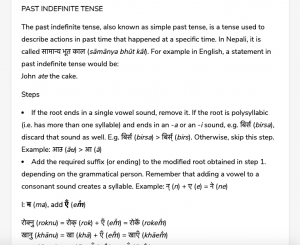
Look at the explanation about Simple Past Tense and create your own guide using Easy Nepali Typing.
For example,
Simple Past Tense (Positive/Negative- “I ate, I did not eat”, etc.)
मैले खाएँ / खाइन
हामीले खायौं / खाएनौं
ततमीले खाय / खाएन
उसले खायो/ खाएन
उनले/ ततनले खाइन्/ खाइनन्
उनीहरु/ ततनीहरुले खाए / खाएनन्
तपाईले/ उहाँले/ हजुरले खानुभयो/ खानुभएन
Now, a bit more advanced past tense:
Unknown Past
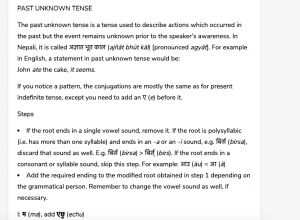
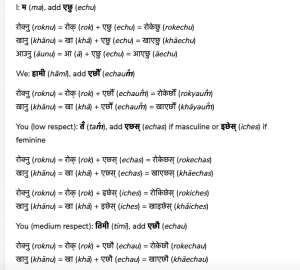
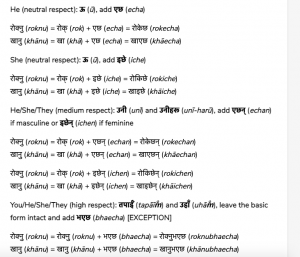
Practice writing your own guide using Easy Nepali Typing:
Unknown Past (Positive/Negative “I ate and now I know, I did not eat and now I know”)
मैले भात खाएँ छु / खाइनछु
हामीले खाएछौँ /खाएनछौं
ततमीले खाएछ / खाएनछ
उसले खाएछ / खाएनछ
उनले/ ततनले खाइछन् / खाइनछन्
उनीहरुले / ततनीहरुले खाएछन् / खाएनछन् तपाईले/ उहाँले/ हजुरले खानु भएछ/ खानु
Then, write some sentences using the various tenses to understand how to use them in context.
Simple Past Tense
मैले चिया खाएँ।
I drank tea.
हामि काठमाडौँ मा गायौं।
We went to Kathmandu.
उसले धेरै चिजहरु बेचेन।
He did not sell many things.
Unknown Past
मैले ठुलो अवाज बोलेँछु
I spoke loudly (and now I know). Or- I spoke loudly, it seems.
तपाईंले उसको कुरा बुझ्नुभेनछ।
You did not understand him (and you just realized this). Or- You did not understand him, it seems.
हामिले छिटो हिडेर आएछौँ।
We came walking quickly, it seems.
Speaking Practice
Lastly, record yourself speaking!! This is good practice to envision how you may use the tenses in context while working on your pronunciation and fluidity. If you have an Apple device, you can use “Voice Memos” to record yourself.
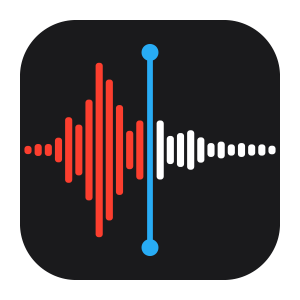
Voice Memos
Or, try out the Peace Corps Dictaphone App.
Then, listen to your voice recordings and note where you think you are struggling for fluency or pronunciation. Note the “nasal” is used often in the past tense for म and हामि! Share your voice memos with your language mentor so they can give you constructive feedback as well. You may even try listening to your voice recording together so you can understand what aspects of your pronunciation need tweaking.
Lastly, HAVE FUN!!

